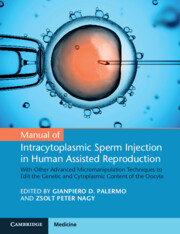 Manual of Intracytoplasmic Sperm Injection in Human Assisted Reproduction
Manual of Intracytoplasmic Sperm Injection in Human Assisted Reproduction Book contents
- Manual of Intracytoplasmic Sperm Injection in Human Assisted Reproduction
- Manual of Intracytoplasmic Sperm Injection in Human Assisted Reproduction
- Copyright page
- Contents
- Contributors
- Foreword
- Chapter 1 In Vitro Fertilization and Micromanipulation
- Chapter 2 Development of ICSI in Human Assisted Reproduction
- Chapter 3 Current ICSI Applications and Clinical Outcomes
- Chapter 4 Rescue ICSI of IVF Failed-Fertilized Oocytes
- Chapter 5 Morphological Sperm Selection Before ICSI
- Chapter 6 Laser-Assisted ICSI
- Chapter 7 Piezo: The Add-On to Standardize ICSI Procedure
- Chapter 8 Artificial Oocyte Activation After ICSI
- Chapter 9 Health of Children Born after Intracytoplasmic Sperm Injections (ICSI)
- Chapter 10 Examining the Safety of ICSI Using Animal Models
- Chapter 11 Cellular and Molecular Events after ICSI in Clinically Relevant Animal Models
- Chapter 12 Micromanipulation, Micro-Injection Microscopes and Systems for ICSI
- Chapter 13 Automation Techniques and Systems for ICSI
- Chapter 14 Germline Nuclear Transfer Technology to Overcome Mitochondrial Diseases and Female Infertility
- Chapter 15 Nuclear Transfer Technology and Its Use in Reproductive Medicine
- Chapter 16 The Prospects of Infertility Treatment Using “Artificial” Eggs
- Index
- Plate Section (PDF Only)
- References
Chapter 15 - Nuclear Transfer Technology and Its Use in Reproductive Medicine
Published online by Cambridge University Press: 02 December 2021
- Manual of Intracytoplasmic Sperm Injection in Human Assisted Reproduction
- Manual of Intracytoplasmic Sperm Injection in Human Assisted Reproduction
- Copyright page
- Contents
- Contributors
- Foreword
- Chapter 1 In Vitro Fertilization and Micromanipulation
- Chapter 2 Development of ICSI in Human Assisted Reproduction
- Chapter 3 Current ICSI Applications and Clinical Outcomes
- Chapter 4 Rescue ICSI of IVF Failed-Fertilized Oocytes
- Chapter 5 Morphological Sperm Selection Before ICSI
- Chapter 6 Laser-Assisted ICSI
- Chapter 7 Piezo: The Add-On to Standardize ICSI Procedure
- Chapter 8 Artificial Oocyte Activation After ICSI
- Chapter 9 Health of Children Born after Intracytoplasmic Sperm Injections (ICSI)
- Chapter 10 Examining the Safety of ICSI Using Animal Models
- Chapter 11 Cellular and Molecular Events after ICSI in Clinically Relevant Animal Models
- Chapter 12 Micromanipulation, Micro-Injection Microscopes and Systems for ICSI
- Chapter 13 Automation Techniques and Systems for ICSI
- Chapter 14 Germline Nuclear Transfer Technology to Overcome Mitochondrial Diseases and Female Infertility
- Chapter 15 Nuclear Transfer Technology and Its Use in Reproductive Medicine
- Chapter 16 The Prospects of Infertility Treatment Using “Artificial” Eggs
- Index
- Plate Section (PDF Only)
- References
Summary
This chapter focuses on the application of nuclear transfer for production of “artificial gametes”, through the haploidization of somatic cells transplanted into immature (germinal vesicle, GV) or mature (metaphase II) oocytes. Haploidization of somatic nuclei through their transfer into oocytes from human, or model mammals has been attempted already with predominantly negative outcomes. In this chapter we critically review the published reports on the topic, with the conclusion that induction of a “totipotent” state to the somatic cell nuclei prior to haploidization has never been taken into consideration. The message our chapter conveys is that advancements in knowledge of in vitro somatic cell reprogramming, and remodeling of somatic cells injected into “selectively enucleated germinal vesicle” (SEGV) oocytes, make realistic the production of artificial gametes through haploidization of somatic cells by nuclear transfer.
- Type
- Chapter
- Information
- Manual of Intracytoplasmic Sperm Injection in Human Assisted ReproductionWith Other Advanced Micromanipulation Techniques to Edit the Genetic and Cytoplasmic Content of the Oocyte, pp. 148 - 153Publisher: Cambridge University PressPrint publication year: 2021
